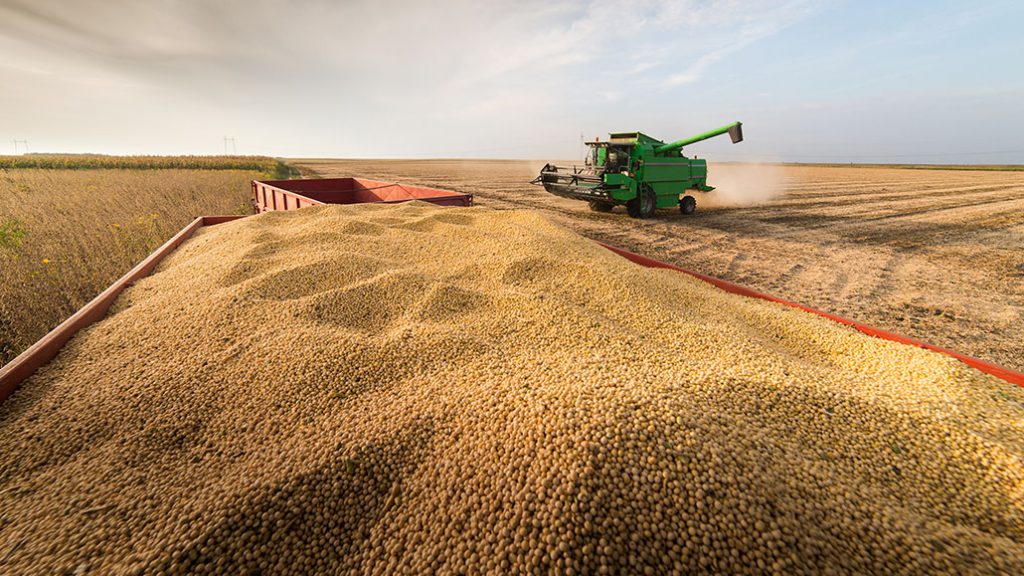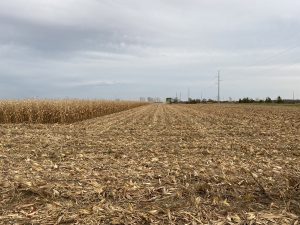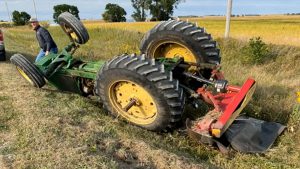Coping with seasonal stress
HOW TO IMPROVE HEALTH AT HARVEST

HARVEST IS THE most stressful time of the year on many farms. Pressure mounts as months of planning and hard work come to fruition and mature crops await the combine.
| WHAT YOU NEED TO KNOW • Stress is your body’s way of responding to any kind of pressure or demand. • Nutrition, exercise, and sleep are crucial to your body functioning optimally. • Communicate with farming and non-farming family and friends during harvest to prevent social isolation. • Finding balance is important. Don’t let go of things that bring you joy, such as hobbies, even during exceptionally busy times. |

The work itself is physically and mentally demanding and the deadlines can be tight. When long hours are combined with poor weather, equipment breakdowns, and other challenges, stress levels escalate and can have a negative and long-lasting impact on the health of those involved.
While eliminating harvest stress may not be realistic, there are management strategies that can be employed to reduce and relieve it. In addition to seeking guidance from health professionals, farmers can learn from each other.
KEVIN ARMSTRONG, WOODSTOCK
Kevin Armstrong grows 800 acres of corn, soybeans, and wheat with his father near Woodstock. Since they are a small team, Armstrong’s biggest source of stress during harvest is getting the job done when the window of opportunity is open.
“When the weather is rainy, the first thing on your mind is that you’ve got a crop out there in the field ready to go. When it comes time that we are able to harvest, the main thing is being able to get enough done in a day that we’re satisfied with our progress,” he says.
Ahead of the busy season, Armstrong, who is the director for Grain Farmers of Ontario’s District 7 (Waterloo, Oxford) and a member of the Board of Director’s Farmer Wellness committee, focuses on maintaining field and drying equipment so there is a lower chance of breakdowns once harvest begins.
“Preparation is all in the maintenance and predicting what could be an upcoming problem,” he says.
From the combine cab, Armstrong uses his phone to make a list of maintenance items that he wants to take a closer look at or may need to watch out for. He uses rainy days to work through the list as another way of preventing a future breakdown.
On a personal note, purposely spending time away from the farm helps him to manage stress. Throughout the season he tries to engage in hobbies and spend time with his family on weekends. But even when the combine is rolling seven days a week, Armstrong is not afraid to take a quick trip to a local mountain biking trail when possible.
“There are plenty of mental health resources out there, but each person has to find their individual way of coping,” he says. “Farmers have a sense of resiliency built into them but having somebody to reach out and talk to is fundamentally the most important thing you can do.”
JUSTIN BELL, PETERBOROUGH
Farming in two locations in addition to working a full-time job makes time management key for Justin Bell. He grows corn, soybeans, wheat, sorghum, and hay and milks 40 dairy cows on his 200 acre organic farm near Peterborough. He also works in agriculture finance and farms an additional 200 acres with his family near Chatham.
“It can be hard to balance work and farming on a regular day,” he says. “Harvest stress is added on top of the day-to-day and when the weather is good, you feel like you have to give 120 per cent.”
Like Armstrong, he tries to complete equipment maintenance ahead of time and usually takes vacation time from the bank to prepare.
When stress is high, Bell finds the structure and routine of daily chores helps him to focus and feel more organized.
“It doesn’t have to be milking cows and for some, it may be going for a run or always having dinner with your family,” he says. “It’s about having something that takes your concentration away from the new stress and adds some routine back into the craziness that a day can become.”
When there is a lot to be done, it’s easy to be emotionally overwhelmed and feel that every job needs to be completed right away. In this scenario Bell finds that writing out a to-do list and then ranking tasks by priority helps him to more clearly see what jobs are most urgent.
He also reaches out to colleagues, friends and neighbours when help is needed. When crops are ready to harvest and the weather is good at his family’s farm, he arranges help in Peterborough to be able to travel.
Before or after stressful times, Bell knows spending time away from the farm and with friends is a good mental health practice that helps him recharge ahead of the next busy season.
JULIE MAW, COURTRIGHT
For Julie Maw, harvest brings the stress of the unknown.
She and her husband Kyle grow corn, soybeans, and wheat and have a custom farming business near Courtright. She also owns and operates a Maizex seed dealership while Kyle works off the farm full-time.
The Maws are parents to three young boys between the ages of four and nine. The way they prepare for and manage busy seasons has changed as their family has grown over the years.
“When you have a family, there is more than just farming to think about,” says Maw. “Now there are kids who go to school and who have other activities and you have to balance and schedule all of it.”
The uncertainty of what days and times will be spent in the field is what makes scheduling so hard. She has found her best way of coping is to focus on what she can control and work to be as organized as possible.
“I can’t control the weather, but I can control groceries and meals, having laundry done, and scheduling help with the kids, even if it’s making plans A, B, and C,” says Maw.
Ahead of harvest she cooks turkeys, chickens, and pork and freezes bags of meat. She finds this method allows her to pull out as much or as little is needed for field meals each week. When harvest is on, she prepares lunches and dinners early in the morning so she knows that meals are taken care of regardless of how the rest of the day goes.
Maw also prepares ‘grab and go’ style activity bags that are filled with things kids can do in a tractor. Since the contents of the bag are a surprise, she finds it keeps her sons entertained for a longer period of time when they do have to ride along.
“In the field it’s important to involve young kids and give them a job, even if it is to watch a wagon fill and tell you when it’s full or count the trees,” she says.
And when stress rises and things are beyond her control, Maw says there is no magic pill but little things like grabbing your favourite snack or turning up your favourite music in the cab can help.
COPING TECHNIQUES
Marnie Wood is a dairy farmer and registered psychotherapist who counsels individuals, couples, and families. She recently launched AgTalk, a new practice specifically for the agriculture community. She recommends five healthy ways of coping when your stress level is high:
- Practice mindfulness. Quiet your mind, be present in the moment, and focus on what you are doing right now. Farmers are outstanding multi-taskers but when there is added stress, it is important to clear your mind and focus on one task.
- Try meditation. Apps such as Calm and Headspace offer guided meditations under two minutes that can be used to reduce and remove adrenaline and other vulnerabilities that come with chronic stress.
- Breathe deeply. Try box breathing by inhaling slowly for seven seconds, holding for seven seconds, and exhaling for seven seconds. This actually changes your physiology and relaxes the body and mind.
- Ground yourself. When panic is setting in, identify five things you can see, four things you can hear, three things you can touch, two things you can smell, and one thing you can taste. This practice works anytime, anywhere.
- Relax your muscles. Sitting quietly, start at your head or feet and progressively squeeze a muscle group as tightly as possible, hold and then relax as much as possible. Repeat with the next area.










